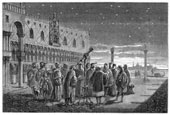Astronomy

- Historical Of Telescopes
Historical of Telescopes Telescopes made their mark in the history almost 400 years back in early 1600?s. It all began when Galileo, an Italian mathematician, invented a new mechanical instrument that helped him in realizing his dream of viewing different...
- 400 Years Of Astronomical Outreach
Today marks a very important anniversary for the International Year of Astronomy 2009. As you may know, the International Year of Astronomy 2009 is being celebrated to promote astronomy on the 400th anniversary of Galileo's first observations of...
- What Is Observational Astronomy?
Among all kind of scientific discoveries and inventions made by people on this earth, astronomy is one of the greatest. Astronomy is one of the oldest sciences in this earth and dates back to the period before Jesus Christ. People started observing the...
- Ptolemy's Geocentric Theory
Ptolemy proposed his Geocentric theory in the 2nd century A.D. What he did was just an elaboration of already existing idea that earth was in the center of universe, proposed by Aristotle, in to a complete cosmological model. According to his theory,...
- Solar System
Solar System Facts The Solar System formed around 4.6 billion years ago. There are eight planets in the Solar System. The four inner planets are Mercury, Venus, Earth and Mars while the four outer planets are Jupiter, Saturn, Uranus and Neptune.For...
Astronomy
Galileo Astronomy

Galileo was born in Pisa, Italy in the late 1500's. He first became a math teacher even though he had no degree in the subject, and here he began his path to greatness. A baby step towards Galileo Galilei astronomy was when he demonstrated to students that different weight objects fell at the same speed, counter to Aristotle's teachings. He wasn't invited back to teach, and so moved to a position at the University of Padua. It was there that his ideas about astronomy truly began.In Padua, Galileo invented the compass and began studying physics. He expanded his work on falling bodies, writing formula to describe them as well as the parabolic path of projectiles. These two ideas were key to astronomy as it progressed. However except for an allegiance to the work of Copernicus over Ptolemy and Aristotle, Galileo claimed to be disinterested in astronomy. It was Copernicus who first described a solar system in which planets orbit the sun. Aristotle and Ptolemy held that the solar system was centered around the Earth, and even the sun rotated around our home. As time went by Copernicus, and Galileo, were proven correct.Galileo was the first to look at the night sky through a spyglass, thus using the first telescope. With a magnification of 20, this telescope helped Galileo discover mountains and craters on the moon. He also learned that the milky way was made up of individual stars. Next he found the four largest moons of Jupiter. He published his findings and became the court mathematician in Florence. Now he could devote full time to his studies. It took him only 9 months to discover Saturn's phases. This was another nail in the coffin for Ptolemy's and Aristotle's ideas about the solar system.Galileo's original dispute was with Aristotle's teachings. Many scientists agreed with Galileo, and so published his findings. But Aristotle was popular with the church because an Earth centered solar system put man's home, and thus man, at the center of things. A Florence priest denounced Galileo Galilei astronomy in 1614. Galileo's response was a letter stating that science was above the bible. A cardinal demanded Galileo stop talking about a moving Earth. Galileo complied, continuing his study of falling objects, comets, and methods to determine longitude at sea based on the phases of Jupiter's moons.
- Historical Of Telescopes
Historical of Telescopes Telescopes made their mark in the history almost 400 years back in early 1600?s. It all began when Galileo, an Italian mathematician, invented a new mechanical instrument that helped him in realizing his dream of viewing different...
- 400 Years Of Astronomical Outreach
Today marks a very important anniversary for the International Year of Astronomy 2009. As you may know, the International Year of Astronomy 2009 is being celebrated to promote astronomy on the 400th anniversary of Galileo's first observations of...
- What Is Observational Astronomy?
Among all kind of scientific discoveries and inventions made by people on this earth, astronomy is one of the greatest. Astronomy is one of the oldest sciences in this earth and dates back to the period before Jesus Christ. People started observing the...
- Ptolemy's Geocentric Theory
Ptolemy proposed his Geocentric theory in the 2nd century A.D. What he did was just an elaboration of already existing idea that earth was in the center of universe, proposed by Aristotle, in to a complete cosmological model. According to his theory,...
- Solar System
Solar System Facts The Solar System formed around 4.6 billion years ago. There are eight planets in the Solar System. The four inner planets are Mercury, Venus, Earth and Mars while the four outer planets are Jupiter, Saturn, Uranus and Neptune.For...
